Contract Law: Analysis of Contractual Capacity and Minors
VerifiedAdded on 2023/01/24
|5
|1329
|26
Report
AI Summary
This report provides an analysis of Australian contract law, with a specific focus on the contractual capacity of minors. It begins by outlining the general requirements for a valid contract, including the necessity of contractual capacity for both parties. The report then delves into the legal limitations placed on minors entering contracts, detailing the age requirements and exceptions, such as contracts for essential items like food and medicine. It discusses the role of parental or guardian consent and the consequences of minors entering into contracts without it, including the potential for voiding contracts. The report references relevant legislation, including the Supreme Court Act 1935 and the Sale of Goods Act 1923 (NSW), and provides a case study involving a minor, Camita and Matthew, to illustrate the practical application of these legal principles. The analysis includes a discussion of the consequences of misrepresentation by minors and the legal recourse available to them, concluding with the importance of seeking legal advice in contract disputes. Finally, the report includes a bibliography of the sources used.
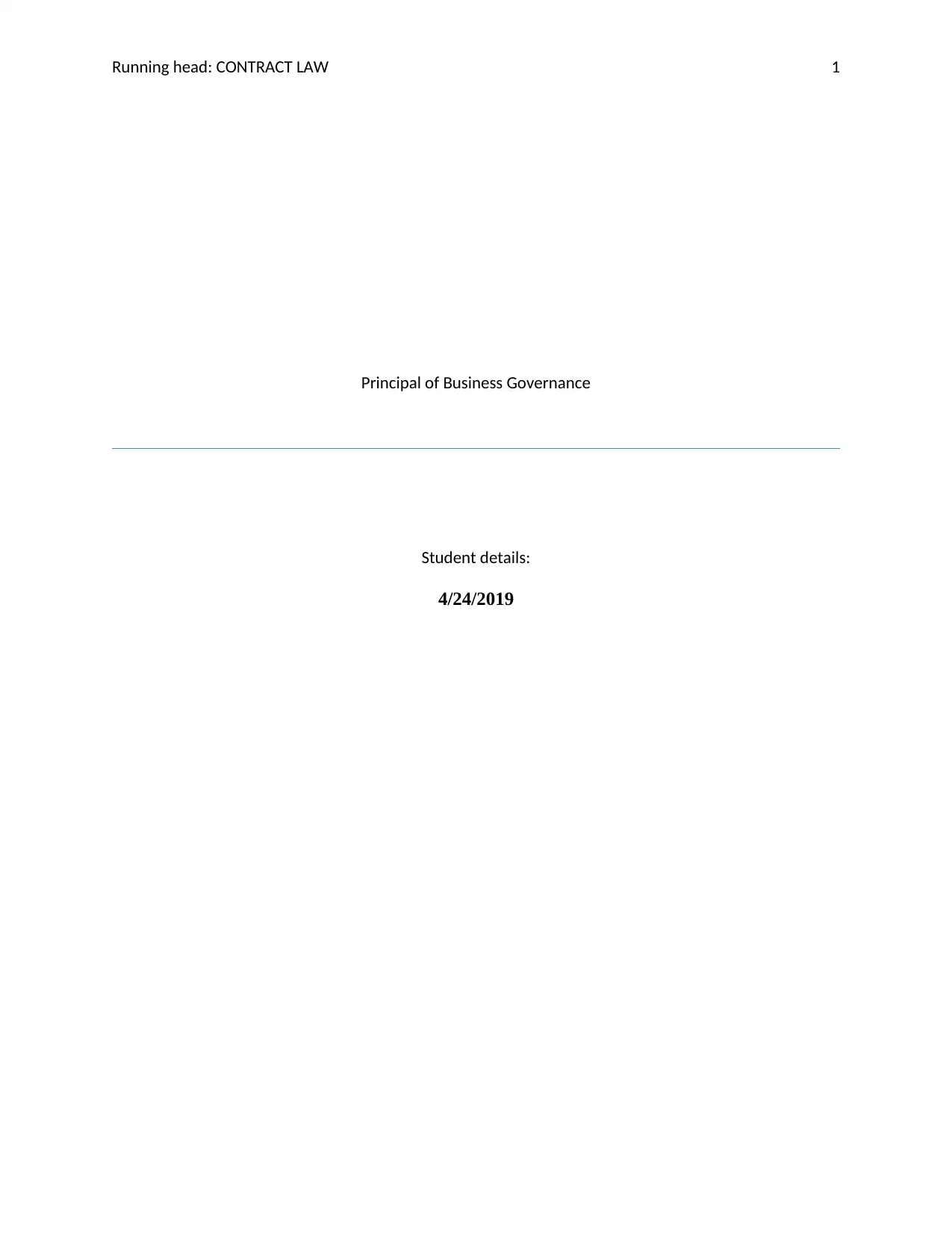
Running head: CONTRACT LAW 1
Principal of Business Governance
Student details:
4/24/2019
Principal of Business Governance
Student details:
4/24/2019
Paraphrase This Document
Need a fresh take? Get an instant paraphrase of this document with our AI Paraphraser
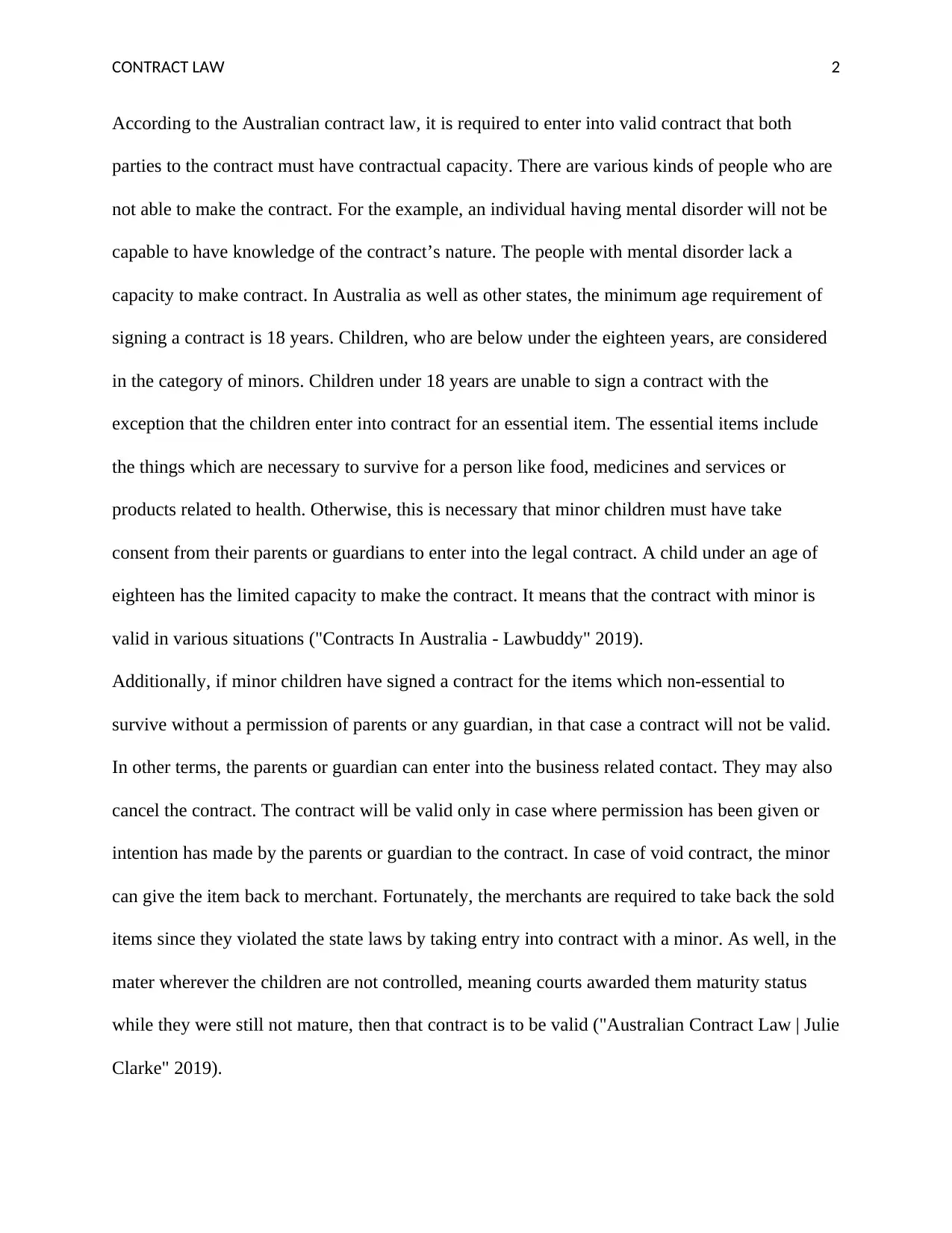
CONTRACT LAW 2
According to the Australian contract law, it is required to enter into valid contract that both
parties to the contract must have contractual capacity. There are various kinds of people who are
not able to make the contract. For the example, an individual having mental disorder will not be
capable to have knowledge of the contract’s nature. The people with mental disorder lack a
capacity to make contract. In Australia as well as other states, the minimum age requirement of
signing a contract is 18 years. Children, who are below under the eighteen years, are considered
in the category of minors. Children under 18 years are unable to sign a contract with the
exception that the children enter into contract for an essential item. The essential items include
the things which are necessary to survive for a person like food, medicines and services or
products related to health. Otherwise, this is necessary that minor children must have take
consent from their parents or guardians to enter into the legal contract. A child under an age of
eighteen has the limited capacity to make the contract. It means that the contract with minor is
valid in various situations ("Contracts In Australia - Lawbuddy" 2019).
Additionally, if minor children have signed a contract for the items which non-essential to
survive without a permission of parents or any guardian, in that case a contract will not be valid.
In other terms, the parents or guardian can enter into the business related contact. They may also
cancel the contract. The contract will be valid only in case where permission has been given or
intention has made by the parents or guardian to the contract. In case of void contract, the minor
can give the item back to merchant. Fortunately, the merchants are required to take back the sold
items since they violated the state laws by taking entry into contract with a minor. As well, in the
mater wherever the children are not controlled, meaning courts awarded them maturity status
while they were still not mature, then that contract is to be valid ("Australian Contract Law | Julie
Clarke" 2019).
According to the Australian contract law, it is required to enter into valid contract that both
parties to the contract must have contractual capacity. There are various kinds of people who are
not able to make the contract. For the example, an individual having mental disorder will not be
capable to have knowledge of the contract’s nature. The people with mental disorder lack a
capacity to make contract. In Australia as well as other states, the minimum age requirement of
signing a contract is 18 years. Children, who are below under the eighteen years, are considered
in the category of minors. Children under 18 years are unable to sign a contract with the
exception that the children enter into contract for an essential item. The essential items include
the things which are necessary to survive for a person like food, medicines and services or
products related to health. Otherwise, this is necessary that minor children must have take
consent from their parents or guardians to enter into the legal contract. A child under an age of
eighteen has the limited capacity to make the contract. It means that the contract with minor is
valid in various situations ("Contracts In Australia - Lawbuddy" 2019).
Additionally, if minor children have signed a contract for the items which non-essential to
survive without a permission of parents or any guardian, in that case a contract will not be valid.
In other terms, the parents or guardian can enter into the business related contact. They may also
cancel the contract. The contract will be valid only in case where permission has been given or
intention has made by the parents or guardian to the contract. In case of void contract, the minor
can give the item back to merchant. Fortunately, the merchants are required to take back the sold
items since they violated the state laws by taking entry into contract with a minor. As well, in the
mater wherever the children are not controlled, meaning courts awarded them maturity status
while they were still not mature, then that contract is to be valid ("Australian Contract Law | Julie
Clarke" 2019).
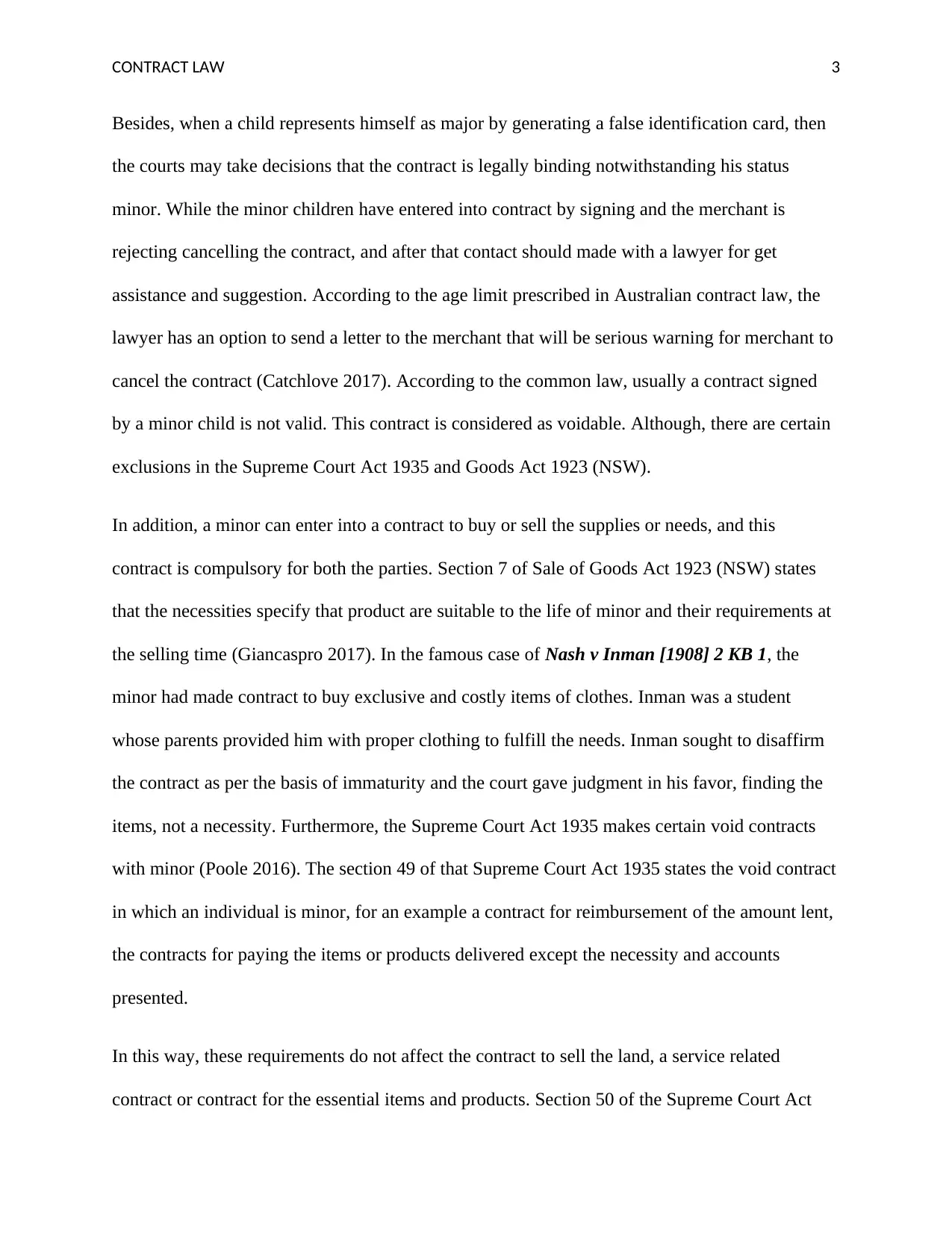
CONTRACT LAW 3
Besides, when a child represents himself as major by generating a false identification card, then
the courts may take decisions that the contract is legally binding notwithstanding his status
minor. While the minor children have entered into contract by signing and the merchant is
rejecting cancelling the contract, and after that contact should made with a lawyer for get
assistance and suggestion. According to the age limit prescribed in Australian contract law, the
lawyer has an option to send a letter to the merchant that will be serious warning for merchant to
cancel the contract (Catchlove 2017). According to the common law, usually a contract signed
by a minor child is not valid. This contract is considered as voidable. Although, there are certain
exclusions in the Supreme Court Act 1935 and Goods Act 1923 (NSW).
In addition, a minor can enter into a contract to buy or sell the supplies or needs, and this
contract is compulsory for both the parties. Section 7 of Sale of Goods Act 1923 (NSW) states
that the necessities specify that product are suitable to the life of minor and their requirements at
the selling time (Giancaspro 2017). In the famous case of Nash v Inman [1908] 2 KB 1, the
minor had made contract to buy exclusive and costly items of clothes. Inman was a student
whose parents provided him with proper clothing to fulfill the needs. Inman sought to disaffirm
the contract as per the basis of immaturity and the court gave judgment in his favor, finding the
items, not a necessity. Furthermore, the Supreme Court Act 1935 makes certain void contracts
with minor (Poole 2016). The section 49 of that Supreme Court Act 1935 states the void contract
in which an individual is minor, for an example a contract for reimbursement of the amount lent,
the contracts for paying the items or products delivered except the necessity and accounts
presented.
In this way, these requirements do not affect the contract to sell the land, a service related
contract or contract for the essential items and products. Section 50 of the Supreme Court Act
Besides, when a child represents himself as major by generating a false identification card, then
the courts may take decisions that the contract is legally binding notwithstanding his status
minor. While the minor children have entered into contract by signing and the merchant is
rejecting cancelling the contract, and after that contact should made with a lawyer for get
assistance and suggestion. According to the age limit prescribed in Australian contract law, the
lawyer has an option to send a letter to the merchant that will be serious warning for merchant to
cancel the contract (Catchlove 2017). According to the common law, usually a contract signed
by a minor child is not valid. This contract is considered as voidable. Although, there are certain
exclusions in the Supreme Court Act 1935 and Goods Act 1923 (NSW).
In addition, a minor can enter into a contract to buy or sell the supplies or needs, and this
contract is compulsory for both the parties. Section 7 of Sale of Goods Act 1923 (NSW) states
that the necessities specify that product are suitable to the life of minor and their requirements at
the selling time (Giancaspro 2017). In the famous case of Nash v Inman [1908] 2 KB 1, the
minor had made contract to buy exclusive and costly items of clothes. Inman was a student
whose parents provided him with proper clothing to fulfill the needs. Inman sought to disaffirm
the contract as per the basis of immaturity and the court gave judgment in his favor, finding the
items, not a necessity. Furthermore, the Supreme Court Act 1935 makes certain void contracts
with minor (Poole 2016). The section 49 of that Supreme Court Act 1935 states the void contract
in which an individual is minor, for an example a contract for reimbursement of the amount lent,
the contracts for paying the items or products delivered except the necessity and accounts
presented.
In this way, these requirements do not affect the contract to sell the land, a service related
contract or contract for the essential items and products. Section 50 of the Supreme Court Act
⊘ This is a preview!⊘
Do you want full access?
Subscribe today to unlock all pages.

Trusted by 1+ million students worldwide
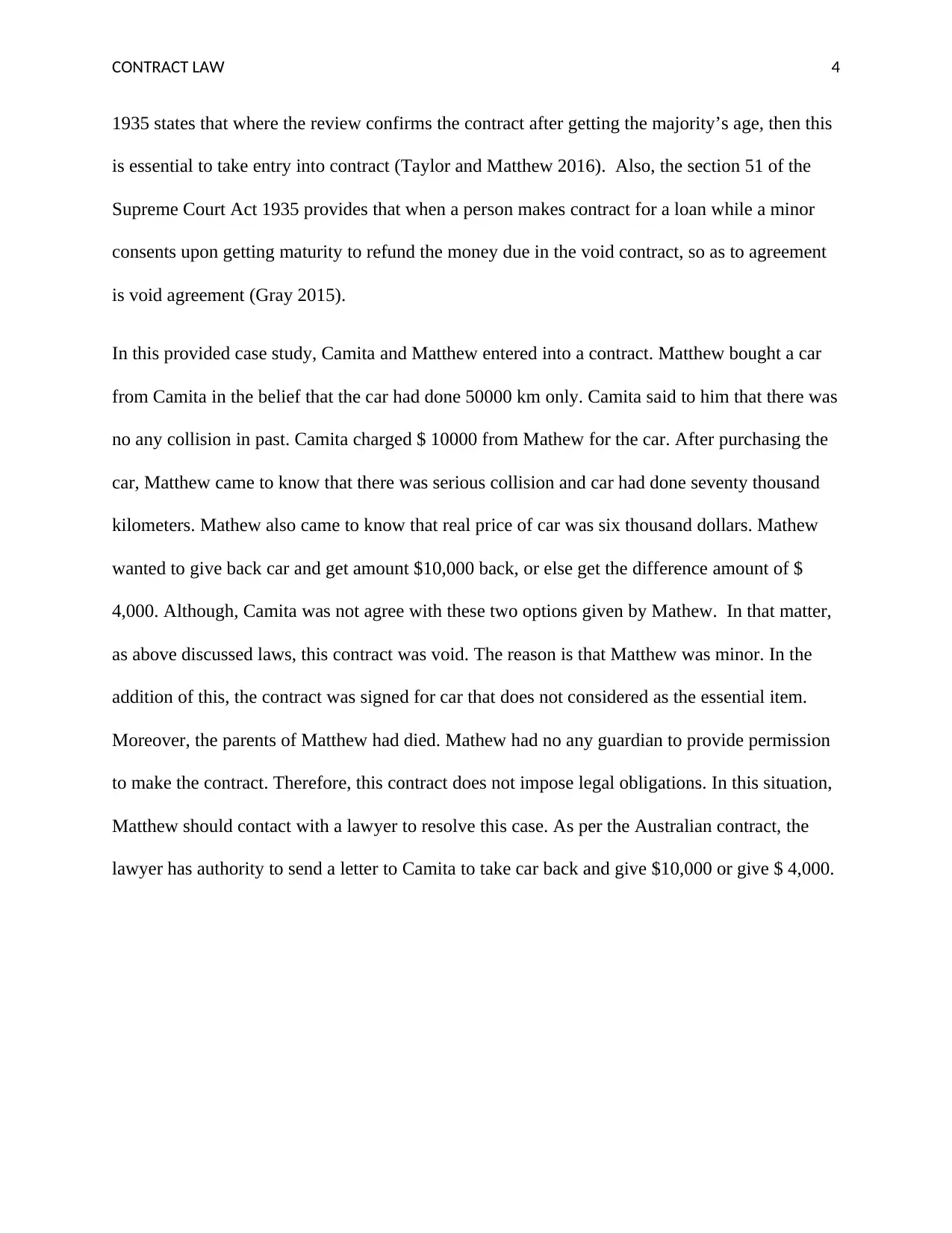
CONTRACT LAW 4
1935 states that where the review confirms the contract after getting the majority’s age, then this
is essential to take entry into contract (Taylor and Matthew 2016). Also, the section 51 of the
Supreme Court Act 1935 provides that when a person makes contract for a loan while a minor
consents upon getting maturity to refund the money due in the void contract, so as to agreement
is void agreement (Gray 2015).
In this provided case study, Camita and Matthew entered into a contract. Matthew bought a car
from Camita in the belief that the car had done 50000 km only. Camita said to him that there was
no any collision in past. Camita charged $ 10000 from Mathew for the car. After purchasing the
car, Matthew came to know that there was serious collision and car had done seventy thousand
kilometers. Mathew also came to know that real price of car was six thousand dollars. Mathew
wanted to give back car and get amount $10,000 back, or else get the difference amount of $
4,000. Although, Camita was not agree with these two options given by Mathew. In that matter,
as above discussed laws, this contract was void. The reason is that Matthew was minor. In the
addition of this, the contract was signed for car that does not considered as the essential item.
Moreover, the parents of Matthew had died. Mathew had no any guardian to provide permission
to make the contract. Therefore, this contract does not impose legal obligations. In this situation,
Matthew should contact with a lawyer to resolve this case. As per the Australian contract, the
lawyer has authority to send a letter to Camita to take car back and give $10,000 or give $ 4,000.
1935 states that where the review confirms the contract after getting the majority’s age, then this
is essential to take entry into contract (Taylor and Matthew 2016). Also, the section 51 of the
Supreme Court Act 1935 provides that when a person makes contract for a loan while a minor
consents upon getting maturity to refund the money due in the void contract, so as to agreement
is void agreement (Gray 2015).
In this provided case study, Camita and Matthew entered into a contract. Matthew bought a car
from Camita in the belief that the car had done 50000 km only. Camita said to him that there was
no any collision in past. Camita charged $ 10000 from Mathew for the car. After purchasing the
car, Matthew came to know that there was serious collision and car had done seventy thousand
kilometers. Mathew also came to know that real price of car was six thousand dollars. Mathew
wanted to give back car and get amount $10,000 back, or else get the difference amount of $
4,000. Although, Camita was not agree with these two options given by Mathew. In that matter,
as above discussed laws, this contract was void. The reason is that Matthew was minor. In the
addition of this, the contract was signed for car that does not considered as the essential item.
Moreover, the parents of Matthew had died. Mathew had no any guardian to provide permission
to make the contract. Therefore, this contract does not impose legal obligations. In this situation,
Matthew should contact with a lawyer to resolve this case. As per the Australian contract, the
lawyer has authority to send a letter to Camita to take car back and give $10,000 or give $ 4,000.
Paraphrase This Document
Need a fresh take? Get an instant paraphrase of this document with our AI Paraphraser
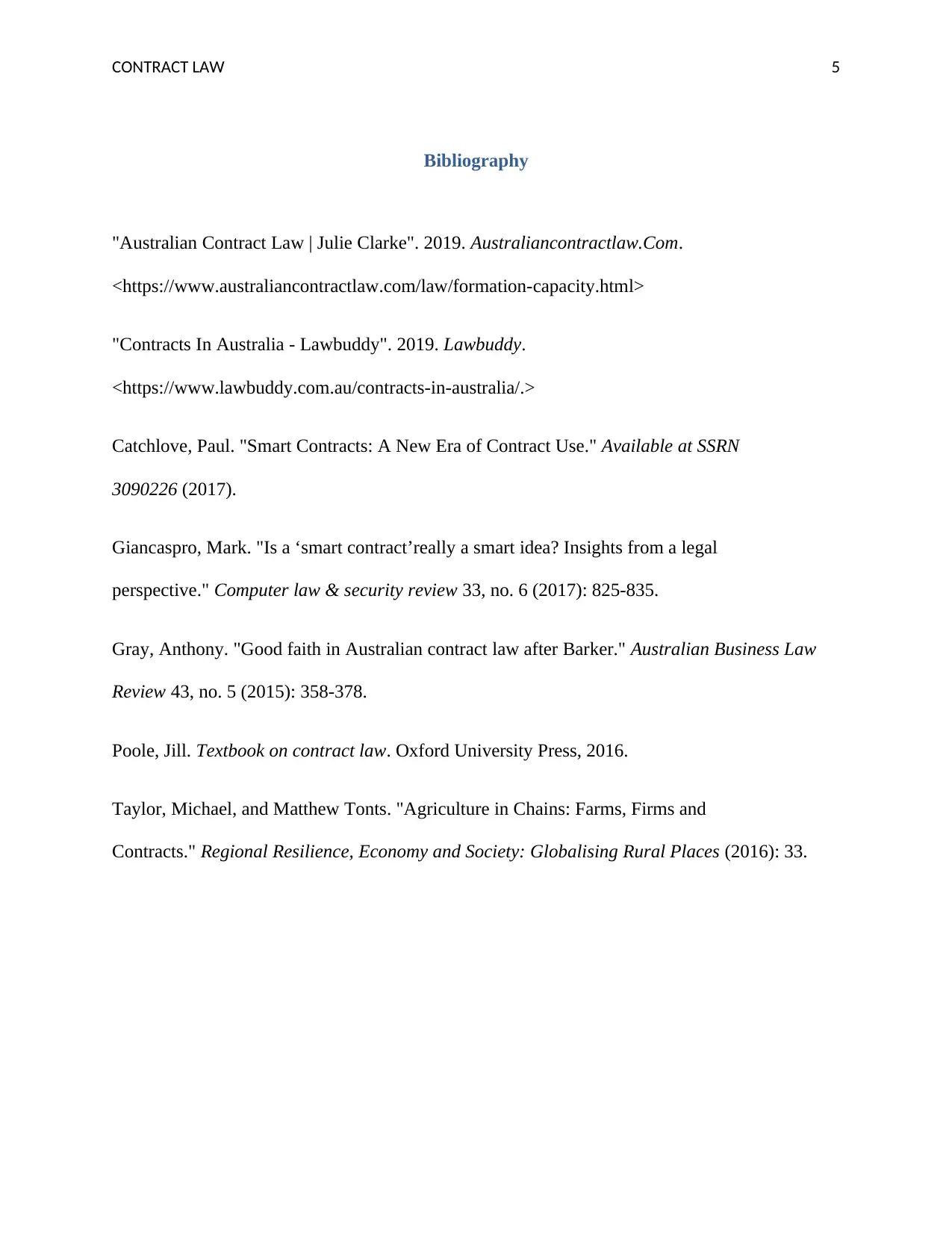
CONTRACT LAW 5
Bibliography
"Australian Contract Law | Julie Clarke". 2019. Australiancontractlaw.Com.
<https://www.australiancontractlaw.com/law/formation-capacity.html>
"Contracts In Australia - Lawbuddy". 2019. Lawbuddy.
<https://www.lawbuddy.com.au/contracts-in-australia/.>
Catchlove, Paul. "Smart Contracts: A New Era of Contract Use." Available at SSRN
3090226 (2017).
Giancaspro, Mark. "Is a ‘smart contract’really a smart idea? Insights from a legal
perspective." Computer law & security review 33, no. 6 (2017): 825-835.
Gray, Anthony. "Good faith in Australian contract law after Barker." Australian Business Law
Review 43, no. 5 (2015): 358-378.
Poole, Jill. Textbook on contract law. Oxford University Press, 2016.
Taylor, Michael, and Matthew Tonts. "Agriculture in Chains: Farms, Firms and
Contracts." Regional Resilience, Economy and Society: Globalising Rural Places (2016): 33.
Bibliography
"Australian Contract Law | Julie Clarke". 2019. Australiancontractlaw.Com.
<https://www.australiancontractlaw.com/law/formation-capacity.html>
"Contracts In Australia - Lawbuddy". 2019. Lawbuddy.
<https://www.lawbuddy.com.au/contracts-in-australia/.>
Catchlove, Paul. "Smart Contracts: A New Era of Contract Use." Available at SSRN
3090226 (2017).
Giancaspro, Mark. "Is a ‘smart contract’really a smart idea? Insights from a legal
perspective." Computer law & security review 33, no. 6 (2017): 825-835.
Gray, Anthony. "Good faith in Australian contract law after Barker." Australian Business Law
Review 43, no. 5 (2015): 358-378.
Poole, Jill. Textbook on contract law. Oxford University Press, 2016.
Taylor, Michael, and Matthew Tonts. "Agriculture in Chains: Farms, Firms and
Contracts." Regional Resilience, Economy and Society: Globalising Rural Places (2016): 33.
1 out of 5
Related Documents
Your All-in-One AI-Powered Toolkit for Academic Success.
+13062052269
info@desklib.com
Available 24*7 on WhatsApp / Email
![[object Object]](/_next/static/media/star-bottom.7253800d.svg)
Unlock your academic potential
Copyright © 2020–2026 A2Z Services. All Rights Reserved. Developed and managed by ZUCOL.




